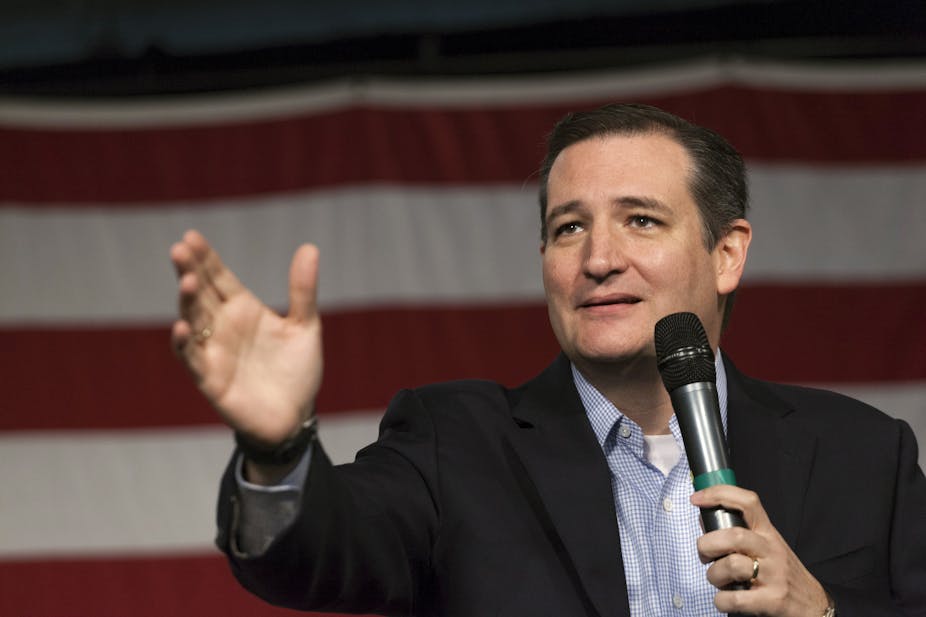Ted Cruz is on a roll.
The right wing Texas senator gave a strong performance in last week’s GOP presidential debate and he is now rapidly lining up key conservative endorsements before the Iowa caucuses.
Even more impressive, the latest polling data and fundraising numbers show significant momentum building behind his campaign. With nearly US$14 million in his campaign coffers, Cruz has more cash-on-hand than any other presidential candidate. Most important of all, he now stands in third and fourth place, respectively, in the most recent CNN and NBC polls of registered GOP voters.
But as his campaign moves into the top tier of GOP candidates, the senator will inevitably face a politically explosive question: is Cruz constitutionally eligible to serve as president?
A Native-born Canadian
The constitutional question stems from the fact that Cruz was born in Canada. To put it mildly, Cruz does not emphasize his Canadian background on the campaign trail. He styles himself as the quintessential arch-conservative Texan, right down to his cowboy boots and right wing politics.
Nevertheless, the fact is that Cruz was born in the Canadian city of Calgary, Alberta in December 1970. Before Cruz’s birth, his mother, an American citizen, and his father, a Cuban citizen, moved to Canada to work in Alberta’s oil industry.
Cruz’s unique background has naturally raised questions about his eligibility to serve as president. Although he renounced his Canadian citizenship in 2014, Cruz was a Canadian citizen for most of his life. Canada has birthright citizenship just like the United States, which means that Cruz automatically became a Canadian at birth. Moreover, Cruz did not even live in the US until 1974, when his parents moved to Texas.
Does the US Constitution permit a native-born Canadian to serve as president?
The Constitution’s citizenship requirement
The answer is yes.
The constitutional analysis turns on the definition of “natural born” citizen. Article II, Section 1 of the Constitution states: “No Person except a natural born Citizen … shall be eligible to the Office of President.”
Crucially, under US law, Cruz was an American citizen at birth. Then and now, federal law provides that a child born abroad to an American parent is a US citizen as long as the parent spent a significant period of time in the US before going abroad. Cruz’s mother spent the first 30 years of her life in the US before her son’s birth. Accordingly, he received automatic American citizenship at birth.
The fact that Cruz became a US citizen at birth is the reason that constitutional scholars believe he is eligible to serve as president. Although the Constitution does not define the term “natural born citizen,” one year after the Constitution’s adoption Congress passed legislation declaring that children born abroad to American parents were “natural born” citizens of the United States. The First Congress’s use of the term “natural born” citizens indicates that the original meaning of the term includes any child who becomes an American citizen at birth.
Cruz clearly meets that definition. Even though born in Canada, he was a “natural born” American citizen by virtue of his mother’s American citizenship.
Thus, from a constitutional perspective, Cruz is eligible to serve as president.
Donald Trump and the birthers
However, the analysis of constitutional scholars does not necessarily hold much weight with Republican primary voters. Indeed, during the last presidential campaign, many Republicans falsely claimed that Barack Obama was constitutionally ineligible to serve in the Oval Office.
Donald Trump led the way in attacking Obama. Trump boasted of evidence that Obama “was born in Kenya” and he demanded to see the president’s birth certificate.
Trump’s claims proved utterly baseless. The White House publicly released Obama’s birth certificate, which proved beyond doubt that the president was born in Honolulu, Hawaii in 1961. Even the conservative magazine National Review conceded that Obama’s Hawaii birth certificate was legitimate.
Nevertheless, Trump’s “birther movement” attracted broad support among Republicans. A 2011 poll found that half of all Republicans believed that Obama was born overseas. Even today, polls show that only one-third of Republicans acknowledge the undeniable fact that Obama was born in the United States.
The enduring appeal of the “birther” issue among Republicans may pose a problem for Ted Cruz. Although Cruz’s partisan affiliation as a Republican will partially insulate him from right wing attacks, some Republicans will undoubtedly be troubled to learn that Cruz doesn’t have an American birth certificate.
Donald Trump certainly seems to think so. Trump has already declared that he believes Cruz’s foreign birth is disqualifying. In March 2015, Trump told Fox News that the Constitution requires the president to be born on American soil, pointedly noting that Cruz “was born in Canada.” Trump warned that “when we all studied our history lessons, you’re supposed to be born in this country.”
Although Trump recently conceded that “every attorney” who has looked at the question says Cruz is eligible, the flamboyant billionaire has a history of ignoring mainstream interpretations of the Constitution.
Therefore, as Cruz rises in the polls, it’s a safe bet that Trump will revisit the issue. If Trump’s track record is any guide, the political question of Cruz’s eligibility for the White House is not likely to go away anytime soon.

